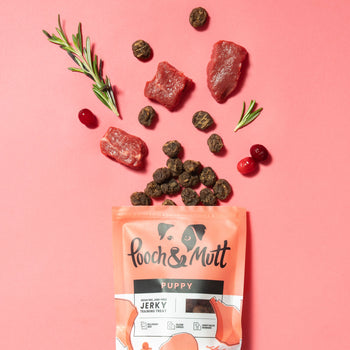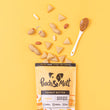
FREE UK DELIVERY ON ORDERS OVER £39.99
As a responsible puppy owner it is vital for your puppy growing into a healthy adult dog and for the health of other dogs that you pup may come into contact with, to get vaccinated.
After your first vet visit, you may leave with a lot of information swirling in your head. Trying to keep on top of their preventative health care can be tricky. Here we discuss everything you need to know about puppy vaccinations and why they're so important.
Everything about your young puppy is still developing, from their body, their brain and their immune system. Vaccinating your pup helps protect them from contracting any nasty diseases. Some of which, as young puppies, they wouldn’t be able to easily fight off.
Vaccinating puppies not only keeps them safe from germs and other nasties but protects other dogs and pets around them from a potential spread. In other words, it makes for happy and healthy pups all round!

Puppies should come home to you having had their first vaccination at around 6-8 weeks old.
Their second round of vaccines should be at around 10-12 weeks, so their immune systems can be boosted and they can face the big wild world safe and protected.
Remember to wait around 2 weeks max after their second vaccination before taking them out for regular walks on a lead to allow the vaccination to fully settle in.
Your vet should provide you with a vaccine booklet which documents what your pup has been vaccinated against, what brand of vaccine was used and when the next dose is due.
It is sometimes the case that the breeder has provided the first vaccine and that this brand is not compatible with the brand used by your local vet. In this case, it is normal for the vet to advise the vaccine course is re-started.
This can be frustrating if you want to take your fluffball out and about. You have the option of calling local clinics to see if the original brand used is stocked by any of them.

The vaccinations given to your puppy are commonly protection from the following:
When your puppy is vaccinated you should retain their vaccination card to keep a record of their cover.
Your puppy may need a booster vaccination at 6 – 12 months old as immunity starts to weaken. You should also speak to your vet about regular check-ups and vaccination top ups throughout your dog’s life to ensure that they are fully covered and vaccines are up to date.
The Rabies vaccine can be given from 12 weeks but is ONLY needed if leaving the UK as Rabies is eradicated in this country.
To help make that first (and any subsequent!) vet visit more tolerable, be sure to approach it strategically. Consider loading up on some tasty treats as it's actually very important that your puppy associates the vet visit with something good and not just a scary needle. This can help reduce anxiety during future visits.
Our Calm & Relaxed Meaty Treats would be the perfect option, helping to make for a chilled-out pooch. Suitable for puppies 12 weeks and older, naturally calming ingredients like hemp, valerian root and L-tryptophan can help to soothe feelings of nervousness and anxiety, which will come in handy for every vet trip!
Reward your puppy with a tasty treat as they arrive in the new ‘strange place’, stand still for the vet check and during their injection. Really, any time they are nice and ‘brave’ we should praise them and offer a treat. Some pups are too anxious to eat but it is still important to offer, just in case.
Though there can be a lot to remember, preventative health care is key when it comes to protecting your precious pooch. If unsure about anything, contact your vet who will be happy to discuss things further.
Never miss a treat!
Subscribe to our newsletter and get blog articles amongst other treats delivered to your inbox





Comments (0)
Leave a comment